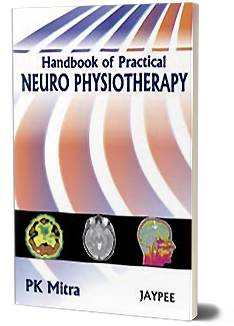This classic, reader-friendly text provides a concise, comprehensive and clinically oriented survey of the human nervous system. Guides to understand the principles of physiotherapy and techniques to manage neurogenic dysfunctions and how all the components of the nervous system fit together and work as a cohesive unit. The diversity of clinical presentation, response and outcome of treatment all have to be studied together to check the long duration of morbidity and physical disability associated with neural disorders. This book explains time tested methods adopted in dealing with neurological disorders and even suggests new concepts in management that are not so popular. It will help students of basic neuroscience as well as residents and physicians to deal with neural disorders.
Handbook of Practical Neuro physiotherapy by Pushpal K Mitra
Discover Handbook of Practical Neuro physiotherapy by Pushpal K. Mitra – a comprehensive guide covering clinical techniques, rehabilitation strategies, and practical applications in neuro physiotherapy for students and professionals.
This classic, reader-friendly text provides a concise, comprehensive and clinically oriented survey of the human nervous system. Guides to understand the principles of physiotherapy and techniques to manage neurogenic dysfunctions and how all the components of the nervous system fit together and work as a cohesive unit. The diversity of clinical presentation, response and outcome of treatment all have to be studied together to check the long duration of morbidity and physical disability associated with neural disorders. This book explains time tested methods adopted in dealing with neurological disorders and even suggests new concepts in management that are not so popular. It will help students of basic neuroscience as well as residents and physicians to deal with neural disorders.
Related products
-
Robbins & Cotran Pathologic Basis of Disease, 10th Edition
KSh 18,480.00Readable and highly illustrated, Robbins and Cotran Pathologic Basis of Disease, 10th Edition presents an in-depth, state-of-the-art overview of human diseases and their cellular and molecular basis. This best-selling text delivers the latest, most essential pathology knowledge in a readable, interesting manner, ensuring optimal understanding of the latest basic science and clinical content. More than 1,000 high-quality photographs and full-color illustrations highlight new information in molecular biology, disease classifications, new drugs and drug therapies, and much more. This superb learning package also includes an enhanced eBook with a full complement of ancillary content on Student Consult
-
Goodman and Gilman’s The Pharmacological Basis of Therapeutics, 13th Edition
KSh 19,028.00Goodman & Gilman’s: The Pharmacological Basis of Therapeutics, Thirteenth Edition represents the pinnacle of authority and accuracy in describing the actions and uses of therapeutic agents in relation to physiology and pathophysiology. Goodman & Gilman’s careful balance of basic science and clinical application has guided thousands of practitioners and students to a clear understanding of the drugs essential to preventing, diagnosing, and treating disease.
The Thirteenth Edition includes more than 500 color illustrations, with many new figures emphasizing mechanisms of drug action. More than 30 new contributors have added to this edition, while the focus on basic principles is undiminished.
This edition is enhanced by timely new content:
- NEW chapters including Treatment of Pulmonary Arterial Hypertension, Immunity and Inflammation, Immunoglobulins and Vaccines, and Treatment of Viral Hepatitis
- Expanded coverage of cardiovascular disease, with separate chapters on myocardial ischemia, hypertension, and heart failure
- Increased emphasis on cellular signaling pathways involved in drug action
- Summary tables at the end of each chapter that organize drugs discussed in that chapter into relevant categories and detail therapeutic usage, clinical pharmacology, and tips
- Chapter Content Outlines at the beginning of each chapter
- Abbreviation boxes in every chapter to easily identify the abbreviations appearing in that chapter
-
Smith and Aitkenhead’s Textbook of Anaesthesia, 7th Edition
KSh 18,612.00This highly successful textbook is internationally renowned as a core text for trainee anaesthetists and is essential reading for candidates for the Fellowship of Royal College of Anaesthetists and similar examinations. The previous 6th edition was awarded First Prize at the BMA Medical Book awards.
The book provides full coverage of the sciences underpinning practice in anaesthesia, critical care and pain management together with details of clinical anaesthesia and perioperative care. In combining these aspects, a generation of anaesthetists have found the textbook invaluable during the first few years of training as well as when preparing for the FRCA and similar professional examinations.
The goal for this Seventh Edition has remained to equip the reader with the basic knowledge and practical considerations required to administer anaesthesia and perioperative care for a whole range of surgical conditions in patients with all common medical comorbidities. Reflecting the expanding role of anaesthesia beyond the operating theatre it also includes essential material related to safety and quality assurance, consent, resuscitation, intensive care medicine, pre-hospital care and chronic pain management.
-
Essentials of Anatomy and Physiology for Nursing Practice
KSh 7,280.00Effective, holistic nursing is impossible without a firm grasp of how the human body functions, but knowledge of the scientific theory on its own is not enough. Written with the needs of nurses firmly in mind and using the person-centred practice framework as a guiding principle, this book brings anatomy and physiology to life, combining the best of print and online learning into one integrated package. Key features: Connects theory with nursing practice by exploring the science from the perspective of a fictional family Uses a rich array of full-color figures, diagrams, and video material including interactive figures, animations and mini-tutorials – perfect for visual learners Full of engaging activities designed to complement self-directed learning. Supported by a collection of digital resources, including 170 online multiple choice questions, over 800 revision flashcards, and complete access to videos, animations, revision material and action plans. Ideal for revision and consolidating knowledge. Visit https://edge.sagepub.com/essentialaandp to find out more. Get 12 months FREE access to an interactive eBook* when you buy the paperback! (Print paperback version only, ISBN 9781473938465) Each purchase includes 12 months access to an interactive eBook version, meaning you can study when and how you want and make use of additional tools including search, highlighting, annotation note sharing and much more. *interactivity only available through Vitalsource eBook
-
Medical Microbiology, International Edition, 19th Edition
KSh 7,462.00Medical microbiology concerns the nature, distribution and activities of microbes and their impact on health and wellbeing. In spite of the introduction of many antimicrobial agents and immunisations, we continue to face major challenges in combatting infection, not least the gathering crisis in antimicrobial resistance.
Now in a fully revised and updated 19th edition, Medical Microbiology provides comprehensive coverage of infection from the microbial perspective, combining a clear introduction to key principles with a focus explicitly geared to modern clinical practice. It provides ideal coverage for medical and biomedical students – with ‘Key Points’ boxes throughout to highlight the essentials – and sufficient detail to also inform specialists in training.
Building on the success of previous editions, updates in Medical Microbiology 19e include:
-
- New and expanded coverage of hot topics and emerging areas important to clinical practice, including:
-
-
- Genomics
-
-
-
- The Human Microbiome
-
-
-
- Direct acting antiviral agents for the treatment of HCV infection
-
-
-
- Molecular methods in diagnostic microbiology
-
-
-
- Antibiotic Stewardship
-
-
- BONUS electronic materials to enhance your learning, including:
-
-
- Clinical cases – to introduce how patients with infections present and help relate key principles to practice
-
-
- MCQs for each chapter – to check understanding and aid exam preparation
-
-
Integrative Human Biochemistry: A Textbook for Medical Biochemistry
KSh 13,750.00This book covers in detail the mechanisms for how energy is managed in the human body. The basic principles that elucidate the reactivity and physical interactions of matter are addressed and quantified with simple approaches. Three-dimensional representations of molecules are presented throughout the book so molecules can be viewed as unique entities in their shape and function.
The book is focused on the molecular mechanisms of cellular processes in the context of human physiological situations such as fasting, feeding and physical exercise, in which metabolic regulation is highlighted. Furthermore the book uses key historical experiments that opened up new concepts in Biochemistry to further illustrate how the human body functions at molecular level, helping students to appreciate how scientific knowledge emerges.
This book also:
- Elucidates the foundations of the molecular events of life
Uses key historical experiments that opened up new concepts in Biochemistry to further illustrate how the human body functions at molecular level, helping students to appreciate how scientific knowledge emerges
- Provides realistic representations of molecules throughout the book
Advance Praise for Integrative Human Biochemistry
“This textbook provides a modern and integrative perspective of human biochemistry and will be a faithful companion to health science students following curricula in which this discipline is addressed. This textbook will be a most useful tool for the teaching community.”
- Elucidates the foundations of the molecular events of life
-
Oxford Handbook of Clinical Specialties (Oxford Medical Handbooks
KSh 6,580.00Now in its 25th year, the Oxford Handbook of Clinical Specialties has been revised and updated by a trusted author team to bring you practical, up-to-date clinical advice and a unique outlook on the practice of medicine. Twelve books in one, this is the ultimate guide to the core clinical
specialties for students, junior doctors, and specialists.This edition features a new and improved referencing system guided by a team of junior doctors, ensuring that the text is packed with valuable references to the most salient data and guidelines across the specialties. Each chapter has been updated on the advice of a team of specialists, to bring you
everything you need for any eventuality on the ward or in the field. This essential handbook guides the reader through the management of an unprecedented spectrum of conditions and eventualties, from sexual health to major incident management. Compact and filled with high quality artwork, directions
to further reading, and wise advice, this book is an ideal resource for revision and reference on the go.With its companion volume, the Oxford Handbook of Clinical Medicine, the Oxford Handbook of Clinical Specialties offers a unique perspective on the practice of medicine. Filled with wit, wisdom, and humanity, this book draws on literature, history, and personal experience to teach a philosophy of
medicine that always puts the patient at the centre of compassionate care. It is a trustworthy companion for anyone with the spirit of self-improvement and a passion for their practice. -
Introduction to Epidemiology
KSh 4,820.00Recognized by Book Authority as one of the best Public Health books of all time, Introduction to Epidemiology is a comprehensive, reader-friendly introduction to this exciting field. Designed for students with minimal training in the biomedical sciences and statistics, this full-color text emphasizes the application of the basic principles of epidemiology according to person, place, and time factors in order to solve current, often unexpected, and serious public health problems.Students will learn how to identify and describe public health problems, formulate research hypotheses, select appropriate research study designs, manage and analyze epidemiologic data, interpret and apply results in preventing and controlling disease and health-related events. With real-world examples in the form of case studies and news files in each chapter, Introduction to Epidemiology is an accessible and effective approach to learning epidemiology.The Eighth Edition features:- Same organization as the prior edition allowing for easier transition- New or expanded coverage of the models of causation, methods of age adjustment, age-period cohort models, incubation and latency periods, and receiver operating characteristic (ROC) curves- Clearer connection between statistical inference and causal inference- New and updated practical examples and News Files help solidify concepts and show real-world application- Updated tables and figures throughout- Access to Navigate 2 online learning materials, including a comprehensive and interactive eBook, student practice activities and assessments, learning analytics reporting tools, and more- A built-in adaptive learning feature enables students to take self-assessments before or after reading a chapter. Based on their performance they can map out their own custom study plan that directs them to the areas of the text to review.










Be the first to review “Handbook of Practical Neuro physiotherapy by Pushpal K Mitra”